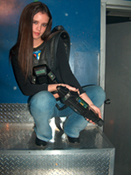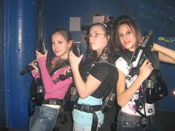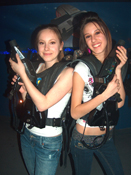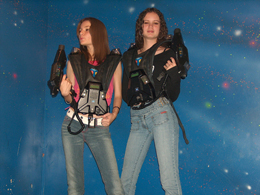|
First,
you'll be led into a briefing room. In the tiered seating area,
your guide will explain the objectives of your mission and the
perils you will face in the Darkzone.
You can sneak a glance at the other two teams you will be
competing against. Your mind will race as your guide leads you through the
rules of the game and instructions on how the Darkzone is played.
Your guide will explain how to score points by stunning or
deactivating the opposition or destroying an enemy base.
After
the briefing comes the moment of truth. You are ushered into the
vesting room, where you and your team mates don your colour-coded
computerized vests and phasers. The atmosphere is tense with steely
determination. Eyes glance down at the vests to check the LCD
readout for the personal vest numbers. The signal is given - Red
Team, Yellow Team, Blue Team....into the airlocks...5 seconds
before the game start.....
4...3...2...1....Start
the game!!!....
You
are now separated into friend and foe, isolated in a small, quivering
chamber, and left to ponder your fate as the game begins. Suddenly
all lights go out and you are surrounded by darkness, buzzers
sound and the airlock door silently slides up and you are to enter
the Darkzone. Your team pours out into an eerily lit, fog filled
maze, accented by black lights, spinning beacons, and heart pounding
music. Sirens, buzzers, music and lights all assault your senses.
This
is it. This is Darkzone!
It doesn't take long to become disoriented. To lose track of home
base. To run across foes who love to
spray random laser blasts at all who stray too near. Whoa! A red
beam of light pierces the darkness and just misses your arm. You
turn to see a shadow with glowing lights disappear into the darkness.
Time to find cover in a dark corner, or behind a wall, but....too
late. A direct hit! Your vest vibrates and your lights extinguish
as you pay the price for your mistake - deactivation. The eight
second deactivation time will seem like an eternity, but before
long your vest will re-energize and you will return to action!
After
an intense and action-packed mission, the final siren sounds,
18 minutes since the debut of your mission, and sweating and panting
you exit the arena. After attaching your phaser and hanging up
your vest, you return to reality to receive your individual, computerized
scorecard. As the game scoreboard finished calculating the games
final result arms fly up in the air and cheers of 'We Won!! We
Won', fill the lobby. That adventure is over, but now it is time
for another ultimate Laser Adventure!

About Our Equipment:
A Quick Q&A
|
We
are constantly asked about our equipment, and if it poses any risks to the
players. It is a fair question and deserves an answer that is readily
understood, yet does not give away all the secrets behind the great game of
Laser Tag. First, the
most asked question is - Can the laser harm your eyes, or do you need to
wear eye protection?
To both questions, the
answer is ........NO!
The 'Phasors' are actually
a dual-mode device. Once the trigger is activated, the Phasor performs two
separate functions. The first is to emit an invisible beam that
'deactivates' other players and base stations, or 'outposts'. When targeted,
these devises record the 'hit' as to which player caused the deactivation.
This is how the Vests and Outposts interact in the game to create a point
scoring system. This 'beam' is the same as the one emitted by your TV remote
control. Although you cannot see it, you are sending information to a
receptor in the TV, and in no way harming either yourself or anyone else
around it. Secondly, the 'Phasor' has a second function, and that is to send
out a beam of light that enables the user to see where his Phasor blast
goes, and also to show the enemy that he is being targeted. The beam of
light you see is enhanced by the use of Fog. By using a fog, you can see the
beam of red light for a great distance. The beam of light emitted by the 'Phasor'
is actually a concentrated light created by an 'LED' (light emitting diode),
to create a laser effect. The beam of light is not intensive enough to harm
the eye. The Phasors are designated a "Class IIa" laser product as compared
to Laser levellers used by builders and contractors that are designated a
"Class IIIa" laser product. The following is an extract from ANSI (American
National Standards Institute):
Class 2 Laser (Low Power)
A Class 2 laser emits light in the visible portion of the spectrum (400-700
nanometers), and eye protection is normally afforded by the normal human
aversion response to bright radiant sources. It may present some potential
for hazard if viewed directly for extended periods of time. (Our Phasors
emit IR for less that one second)
The second most frequently
asked question is, Can my kid get hurt?
This is one of the easiest
ones to answer. We have very strict guidelines on the playing format. There
is a briefing set out before every game outlining the rules and conduct
demanded during every game. First, NO PHYSICAL CONTACT! No player is allowed
to touch another player during the game. You are not allowed to block or
impede any other player. Next, NO RUNNING! The Maze is a vast area of
corridors, turns, dead-ends, as well as loud music, spinning lights, black
lights, fog and other sensory enhancing effects. You will have a far greater
appreciation of the game if you play with 'stealth' rather than speed. Next,
NO CLIMBING! This is self explanatory. And lastly, probably the most
important, RESPECT YOUR GUIDES AND OTHER PLAYERS! It is not wise to 'lose
your cool' during a game. Any behaviour that is deemed unacceptable by the
guides will cause them to deactivate your vest and escort you from the
playing area. Depending on your situation, you may be ejected from the site.
There are no refunds!!! So, to answer the question, NO, your child
should not get hurt under normal playing circumstances, and in several years
of operation, we have had only a few minor incidents.
Another question we are
frequently asked is: What is the minimum age to play at Darkzone?
Well, in general terms, we require that the child be at least 6 years old.
Why 6? Well, that is the age that seems to set apart the young ones: 1) that have difficulty understanding the requirements and rules to play the game,
and 2) are at the size where the wearing of the equipment is not
uncomfortable. (The Vest and Phasor combined equal only 7 lb. The third
reason is the most important! Some young children do not readily possess
the capacity to distinguish between fantasy and reality. The Darkzone game,
with all its enhancements is meant to create a feeling of exhilaration for
the players and some young children feel threatened by so much input at
once. They also feel threatened by being targeted by other players, and they
do not yet possess the cognitive skills required to play the game properly
without being overwhelmed.
We have had thousands of Hockey, Birthday and Daycamp children at 6 years
old, and it is rare that they abandon a game, so that is the age limit we
set.
If you do want your 5 year
old to try the game, be warned, a Supervisor will try to change your mind,
but bearing that, and you want to forge ahead - be advised in advance:
There Are No Refunds!
Another FAQ: If my kids are
going to stay there all day (ŕ Volonté), is there somewhere they can eat?
We have locker rentals for an hour($2)
or for the entire day ($4). (You will need to leave some form of identity card for the key deposit). The
lockers are large enough for two or three kids to store their stuff, and
tables are available in the lounge for lunches, ect. If you bring a cooler,
a warning, they do not fit in any lockers and you leave them at your own
risk! We do not supervise personal belongings.
What type of clothes should
I wear?
Darkzone is an extremely strenuous sport.
Every game will leave you hot, dehydrated and breathless. No matter what time of the year,
one thing is sure, you will sweat in abundance after your game. So, the
lighter the clothes, the better. If you intend to spend the day, Shorts and
a T-Shirt are a great choice. (We have large bathrooms that can be used as a
changing area).
|
|
|









